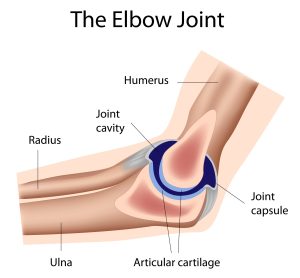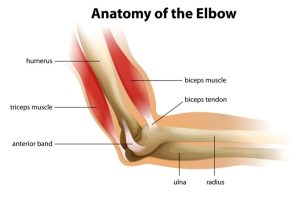When you bend or extend your arm, it is common to hear cracking, grinding, popping, or clicking sounds. Even if the noise is painless, you are not alone if your first instinct is to make an appointment with a doctor to ask, “Why does my elbow pop?”
Regardless of the severity of your elbow condition, EmergeOrtho—Triangle Region is committed to helping you find health-related answers and fixing your injuries so that you can live pain-free and enjoy your favorite activities. In this blog, learn about the elbow’s anatomy, common reasons for elbow popping, and whether or not your elbow requires a doctor.
The Anatomy of the Elbow
 To answer the question “Why does my elbow pop?” it is useful to start by looking at the elbow’s anatomy.
To answer the question “Why does my elbow pop?” it is useful to start by looking at the elbow’s anatomy.
The elbow is a complex joint with three bones: the humerus, radius, and ulna. Each of the bones has cartilage on its ends, surrounded by ligaments that form the joint capsule. The joint capsule is a fluid-filled sac that both protects the joint and lubricates it.
In addition to the bones, your elbow is a connection point for the muscles and tendons that support arm function. Your forearm muscles, for example, run across the elbow joint and connect to the humerus via the lateral and medial epicondyle. These tendons are the most common areas of tendinitis, which can cause pain and elbow popping.
Additional muscles attached to the elbow joint via tendons and ligaments include the biceps and triceps on the front and back of your upper arm. The radial, ulnar, and median nerves also travel past the elbow and may be affected by a joint injury.
So Why Does My Elbow Pop?
In many cases, elbow popping is harmless. If you hear a popping noise, but any pain or swelling does not accompany it, it is most likely due to age or overuse.
As we age, the cartilage at the end of the arm bones wears away, keeping the bones from moving smoothly and causing more sounds. Again, these sounds are common unless you have pain, stiffness, or limited range of motion and should not cause concern.
Elbow popping and cracking noises can also be due to a buildup of gas inside the joint. Nitrogen gas naturally builds up in the spaces inside your joint, and when you move, it causes cavitation that pushes the gas out. It is the same process that causes the snapping sound when you crack your knuckles.
Overuse can also cause joint sounds like elbow clicking. When you repeatedly bend your elbow, such as when lifting weights, a clicking or grinding sound could indicate that your muscles are tight and need more stretching. Sometimes, the sound comes from tendons sliding over the bone, which can also be alleviated by proper stretching.
If you have pain in addition to elbow noises, especially if you hear a loud “pop” followed by intense pain and swelling, then the issue is more severe and needs medical attention. Some of the most common injuries and conditions include:
 Biceps tendon tear at the elbow. Although not an especially common injury, it involves a loud pop, intense pain, bruising, and weakness when the bicep muscle detaches from the elbow joint.
Biceps tendon tear at the elbow. Although not an especially common injury, it involves a loud pop, intense pain, bruising, and weakness when the bicep muscle detaches from the elbow joint. - Tennis elbow. Lateral epicondylitis, also known as tennis elbow, is inflammation or micro-tearing of the elbow tendons caused by overuse. It is common among tennis and racquet sports players but can also appear in anyone who performs repetitive motions of their forearm, wrist, and hand. Symptoms include popping sounds, worsening pain on the outside of the elbow, and a weak grip.
- Osteoarthritis. Although almost everyone experiences some joint deterioration with age, it can progress to arthritis in some people. It is most common in those who have experienced an elbow injury or overuse of the joint. For example, baseball pitchers have a high incidence of elbow arthritis. However, osteoarthritis sounds less like popping and more like grinding or grating.
When to See a Doctor
If you hear your elbow clicking only occasionally and you are not experiencing any joint pain or discomfort, you do not need to see a doctor.
However, if the noise worsens and you experience swelling and persistent pain, make an appointment to see an orthopedic specialist. Depending on the condition of your joint, treatment will likely include a combination of rest, immobilization, medications, cold therapy, and physical therapy. Surgery may be necessary in extreme cases but is typically only recommended when less invasive treatments are ineffective.
Noises coming from your elbow joint can be alarming, particularly when they occur suddenly. But, the board-certified orthopedic doctors at EmergeOrtho—Triangle Region are here to help identify and treat elbow injuries.
To make an appointment with one of EmergeOrtho’s providers, self-schedule your appointment here, or call us any time at 984.279.3656




